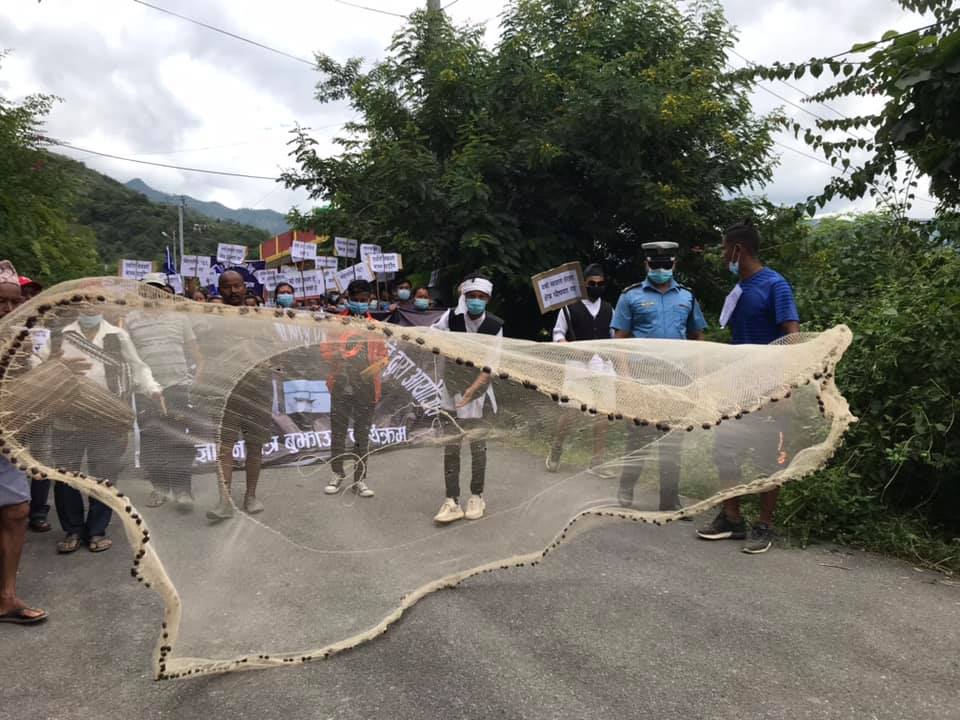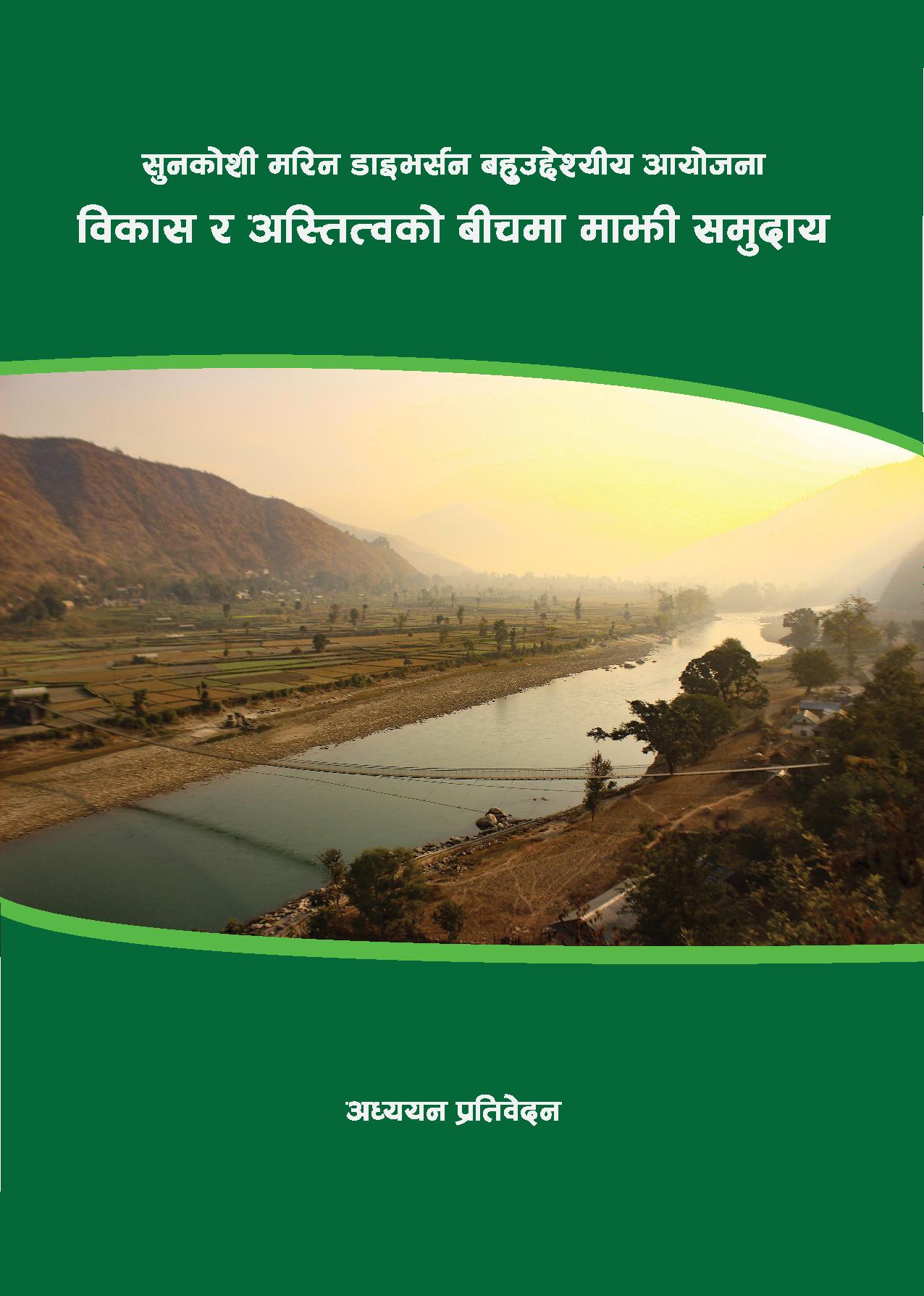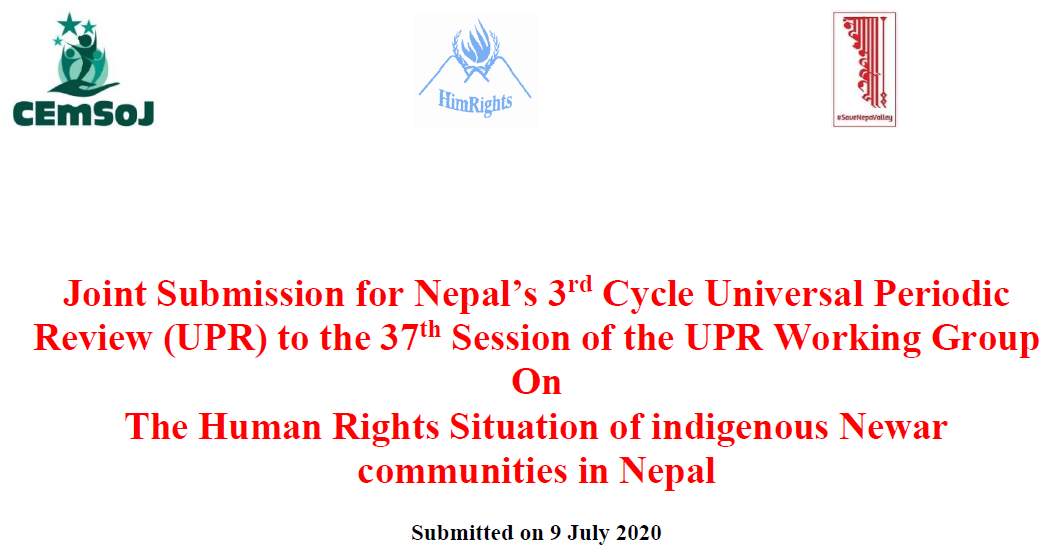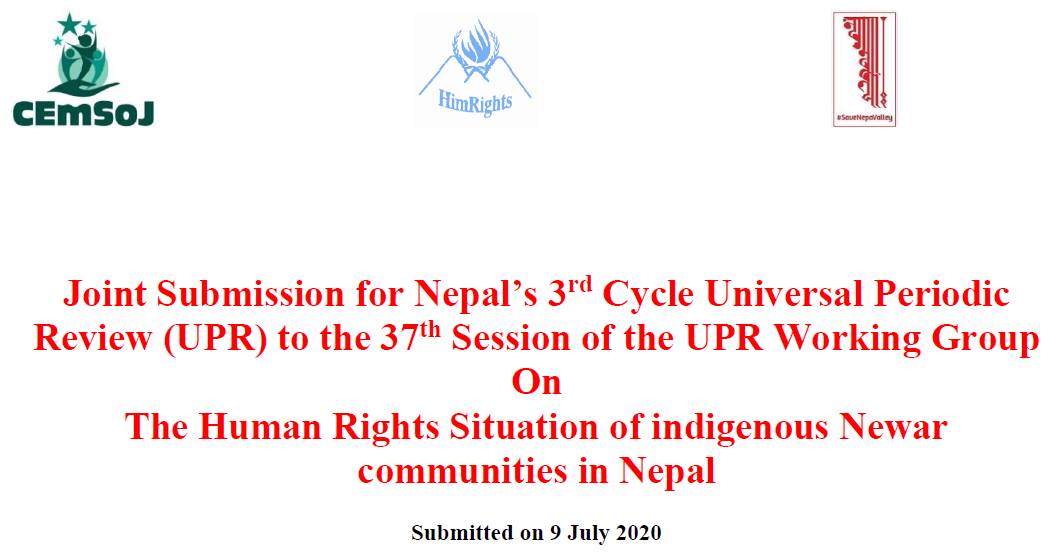१ डिसेम्बर २०२०, काठमाडौँ
काठमाडौं- तराई/मधेस द्रुतमार्ग (फास्ट ट्र्याक) लगायत खोकना र बुंगमतिमा निर्माणाधीन वा प्रस्तावित विभिन्न पूर्वाधार विकास तथा सहरीकरणका परियोजनाबाट प्रभावित ती ऐतिहासिक बस्तीका आदिवासी नेवार समुदायले जेनेभास्थित संयुक्त राष्ट्र संघका दुई विज्ञहरूलाई ती परियोजनाले समुदाय विस्थापित हुने गम्भीर खतरा रहेको, तिनको भुमि र स्रोतसाधन माथिको अधिकार र सांस्कृतिक अधिकार उल्लङ्घन भएको र अन्य प्रतिकूल असर पार्ने भएकोले प्रभावित समुदायका अधिकार रक्षा गर्न तुरुन्त कदम चाल्न आग्रह गरेका छन्।
प्रभावित समुदायको दुई प्रतिनिधि समूहहरु (जनसरोकार समिति खोकना र बुंगमती) ले आदिवासी जनजातिका अधिकार र सांस्कृतिक अधिकारको क्षेत्रका संयुक्त राष्ट्र संघका विशेष समाधिक्षक (Special Rapporteurs) हरुलाई आज पठाइएका पत्रमा ती समाधिक्षकहरुलाई फास्ट ट्र्याकलगायतका परियोजनाबाट प्रभावित आदिवासी जनजातिका भुमि, स्रोतसाधन, पवित्रस्थल र संस्कृतिको अधिकार संरक्षण र प्रवर्द्धन गर्न नेपाल सरकारलाई संयुक्तरुपमा पत्राचार गर्न अनुरोध गरिएको छ। फास्ट ट्र्याकबाहेक बागमती कोरीडोर, बाहिरी चक्रपथ, थानकोट-भक्तपुर प्रसारण लाइन, काठमाडौं उपत्यकामा प्रस्तावित चारवटामध्येको एक ‘स्मार्ट सिटी’ लगायत लगायतका परियोजनाले आदिवासी नेवार समुदायका पूरै ऐतिहासिक बस्ती विस्थापित हुने पत्रमा भनिएको छ। तीमध्ये विभिन्न परियोजनालाई एशियाली विकास बैंकले प्रत्यक्ष वा अप्रत्यक्ष रूपमा सहयोग गरेको छ।
जनसरोकार समिति खोकना र बुंगमतीले विशेष समाधिक्षकहरुलाई सरकारलाई निम्न कदम चाल्न पत्राचार गर्न अनुरोध गरेका छन् :
- निर्माणाधीन फास्ट ट्र्याक द्रुतमार्गको निर्माणकार्य तुरुन्त रोकी खोकना र बुंगमतीको कृषियोग्य र गुठी जग्गाको साथै ऐतिहासिक र सांस्कृतिक स्थलहरूको संरक्षण हुने तरिकाले द्रुतमार्गको रुट (alignment) परिमार्जन गर्नुपर्ने,
- खोकनामा द्रुतमार्गको निर्माणको लागि बनाइएको नेपाली सेनाको शिविर (camp) र अन्य संरचनाहरू हटाई कब्जा गरिएका जग्गाहरू सम्बन्धित जमिन जग्गाधनीलाई फिर्ता गर्नुपर्ने,
- द्रुतमार्ग लगायतका परियोजनाको सन्दर्भमा आफ्नो सरोकार र विरोधका आवाज उठाउन प्रभावित समुदायको शान्तिपूर्ण भेला हुने र अभिव्यक्ति स्वतन्त्रताको अधिकार सुनिश्चित गर्दै उनीहरूको सरोकारका विषयहरुमा सार्थक वार्ताको लागि वातावरण सिर्जना गर्नुपर्ने, र
- प्रभावित समुदायहरूको जमिन र स्रोतसाधन माथि असर पार्ने फास्ट ट्र्याक द्रुतमार्ग र अन्य परियोजनाहरूको लागि समुदायको स्वतन्त्र, पूर्व र सूचित सहमति लिनुपर्ने।
यसअघि प्रभावित समुदायहरूले काठमाडौंमा रहेका अन्तर्राष्ट्रिय श्रम संगठन (आईएलओ), युनेस्को र संयुक्त राष्ट्र संघका कार्यालयहरूलाई पनि यस्तै पत्र पठाएका थिए। ती कार्यालयका प्रतिनिधिहरूले समुदायका सरोकार र मागहरु बुझ्न खोकना र बुंगमतीको स्थलगत भ्रमण पनि गरेका थिए। यद्यपि सरकारले प्रभावित समुदायहरूसँग अर्थपूर्ण वार्ता गर्न ती कार्यालयहरूले सहजीकरण गरिदिन सक्ने भनी गरेको पत्राचारको सरकारले सकारात्मक प्रतिक्रिया दिएको छैन।
वर्षौंदेखि, खोकाना र बुंगामतीका स्थानीयहरूले ती विभिन्न परियोजनाहरूको विरोधमा विभिन्न भेला, जुलुस, प्रदर्शन लगायतका कार्यक्रमहरु आयोजना गर्दै आएका छन्। ती प्रदर्शनहरुको प्रतिक्रियामा प्रहरी प्राय क्रूर दमनको साथ प्रस्तुत भएका छन्। असारमा फास्ट ट्र्याकको प्रस्तावित जिरो प्वाइन्ट खोकनाको खुदोलमा आयोजित “धान रोपाई” विरोध कार्यक्रममा प्रहरीले हस्तक्षेप गर्दा प्रदर्शनकारी र प्रहरीबीच झडप भएको थियो। प्रहरीले अश्रुग्याँस प्रहार गरी लाठीचार्ज गर्दा एक दर्जनभन्दा बढी प्रदर्शनकारीहरू र चार प्रहरी पनि घाइते भएका थिए। हालसालै, लगभग दैनिकजसो स्थानीयहरूलाई कोभिड-१९ को महामारीमा सर्वसाधारणलाई घरभित्रै बस्न प्रतिबन्धात्मक आदेश दिई प्रभावित समुदायको निजी तथा गुठी जग्गाहरूमा फास्ट ट्र्याक निर्माण गर्न खटाइएका ठेकेदारहरूसँग निर्माणस्थलमा चर्को विवाद बहस गरिरहनु परेको छ।
माघमा, खोकना र बुंगमतीका पचास भन्दा बढी प्रभावित स्थानीय र समुदायका प्रतिनिधिहरूले तिनका ऐतिहासिक बस्ती र त्यहाँका समुदायहरूको संरक्षणको लागि फास्ट ट्र्याक लगायतका विभिन्न “विकास” परियोजनाहरूको बिरूद्ध नेपालको सर्वोच्च अदालतमा रिट निवेदन दिएका थिए। तर, फास्ट ट्र्याकको निर्माण निरन्तर प्रगति भइरहेको छ भने अदालतले उक्त निवेदनमा सुनुवाई पटक-पटक स्थगित गरिरहेको छ। विशेष समाधिक्षकहरूलाई पठाइएका पत्रमा प्रभावित समुदायले नेपाल पक्ष राष्ट्र रहेको अन्तर्राष्ट्रिय श्रम संगठनको आदिवासी जनजाती सम्बन्धि महासन्धि १६९ (ILO C169) तथा आदिवासी जनजातिको अधिकार सम्बन्धी संयुक्त राष्ट्रसंघीय घोषणापत्रलगायत विभिन्न अन्तर्राष्ट्रिय र राष्ट्रिय कानुनमा प्रत्याभूत उनीहरूको अधिकारको हनन भएको जानकारी गराएका छन्।
थप जानकारीको लागि विशेष समाधिक्षकहरूलाई बुझाइएका पत्रहरुको अनुसूची (अंग्रेजीमा) पढ्न यहाँ क्लिक गर्नुहोस्।
थप विवरण वा सोधपुछका लागि जनसरोकार समिति खोकनालाई khokanajanasarokarsamiti@gmail.com मा सम्पर्क गर्नुहोस्।



